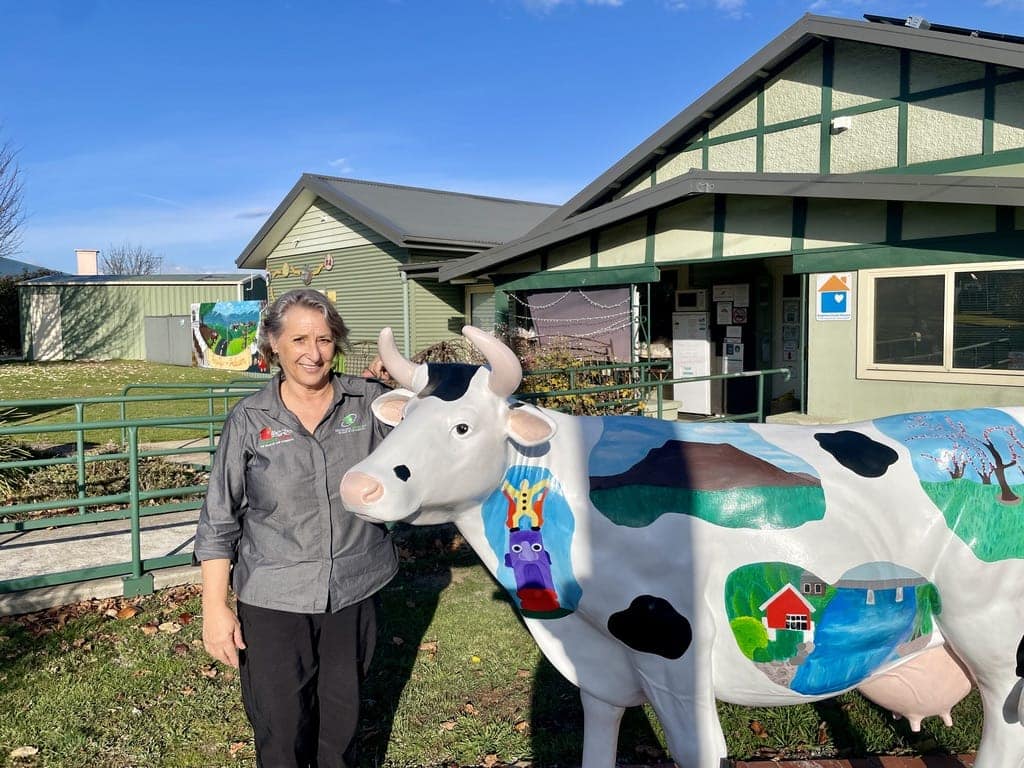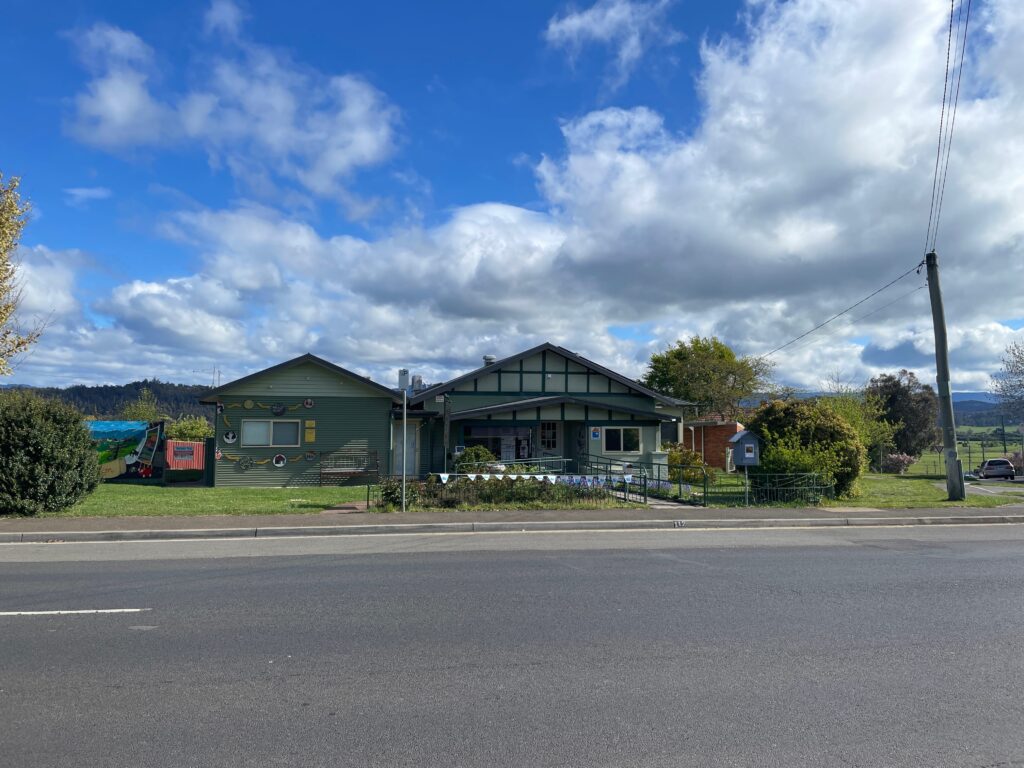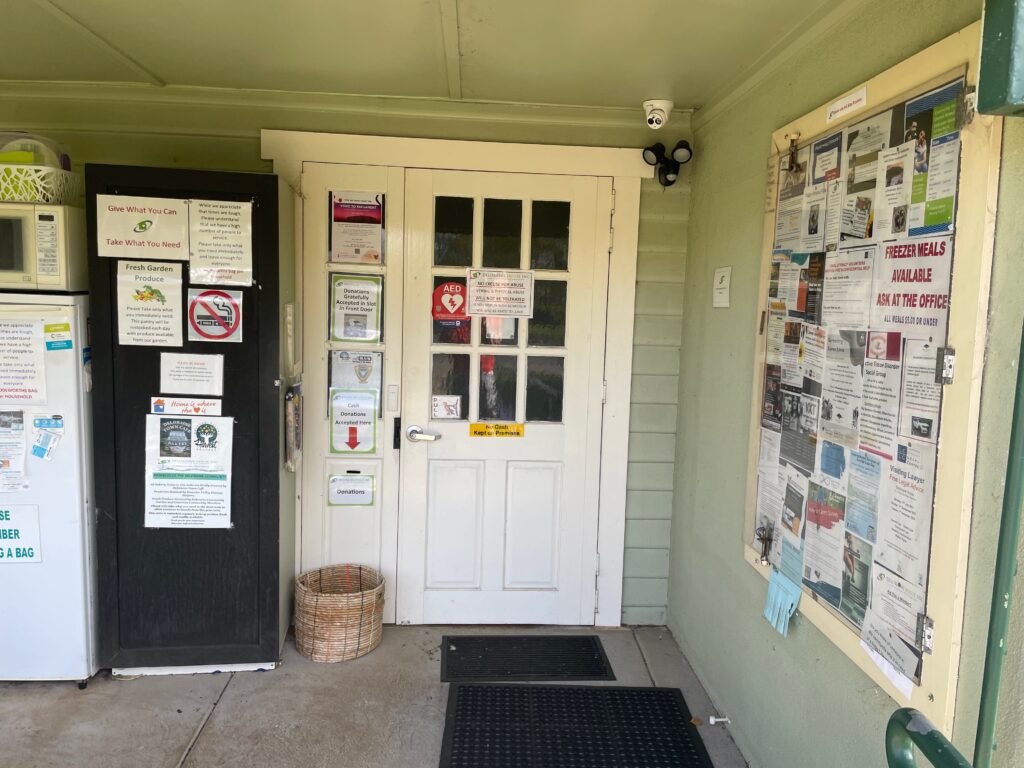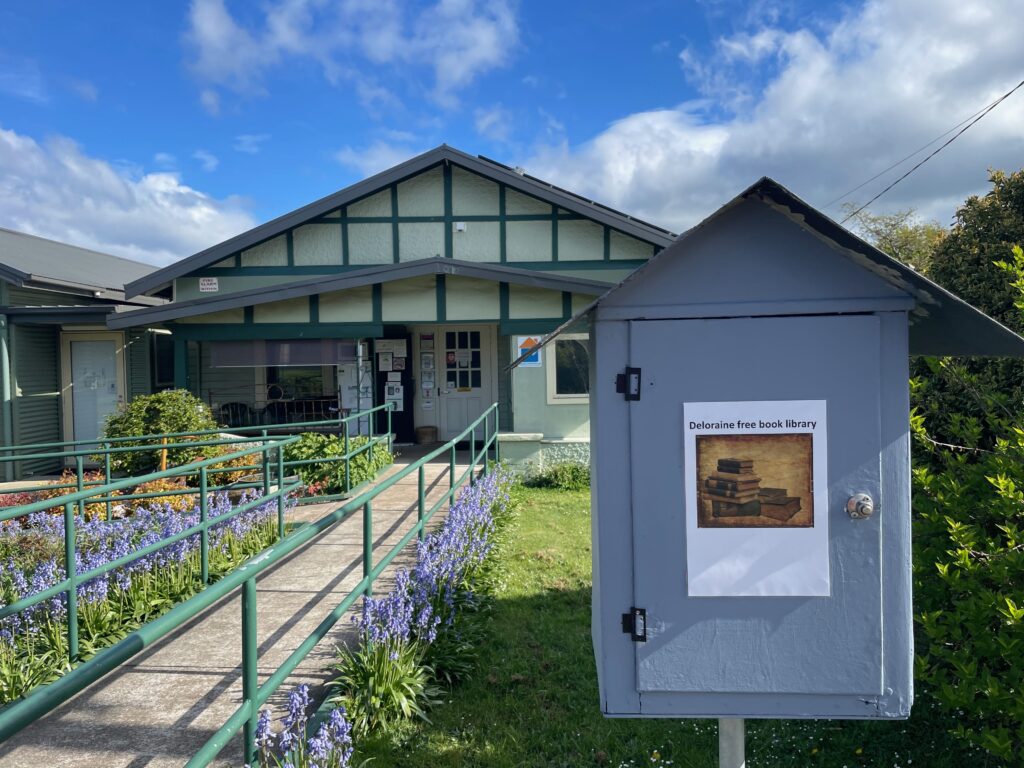Our chat with Debbie Smith, the manager at Deloraine House. The organisation provides support for many people throughout the Deloraine community, and Debbie is clearly an effective manager – capable of outstanding results with limited resources. Here is the transcript.
Matt Taylor: Debbie, can you talk a little bit about what Deloraine House does?
Debbie Smith: There’s no such thing “there’s a little bit” about what Deloraine House does. We have services that come in. At the moment, we have 20 visiting services. So they are services that do outreach to Deloraine from Launceston or Devonport.
We also have 23 community groups that use this house on a daily basis. So, every day, every room is full and that’s why we bought Meander House. And we also have now visiting services that go to Meander and groups that use those as well. We have three community gardens one at Mole Creek, one here at Deloraine and one at Meander.
We’ve just bought a property next door, so we’re looking to do low cost rental.
Matt Taylor: Next door to here (Deloraine House)?
Debbie Smith: It used to be the old Lethborg House which was the old undertaker’s house, so we’ve got that. There’s something that happens here all the time. We have playgroups, we have affordable meals. We have emergency relief food.
We do NILs loans – which is no interest loans. So we’re agents for that. We have Tai Chi. It’s just across the board. Everything’s here.
Matt Taylor: Is there a focus for the organisation?
Debbie Smith: No, we’re community driven. So it is about changing with our community.
We were very different during COVID. We cut down a lot of our – what we call our fringe services – and just concentrated on what the immediate needs for things. We’ve had to do that again. And when we had floods, we became recovery after the floods. So it is about us changing to the needs of the community at that time. So there’s no, there’s no actual, ‘we have a mission’ but the actual focus of the house changes quite often. It’s about being adaptable.
Matt Taylor: And in terms of getting feedback and what the next sort of thing to do is, is that guided by the board?
Debbie Smith: We have a board of governance. And they are actually guided by the community. So we survey our communities every quarter. We also do outcomes reporting, so a lot of that reporting is about feedback and stats and data that we get through our groups that use the house and the participants who come through the door.
We put through, we had 21, nearly 22,000 people in the last financial year, which equates to one service every 10 minutes for the time we’re open.

Matt Taylor: There must be quite a team involved in getting everything happening here.
Debbie Smith: We are funded for two full time equivalents So that’s two houses running on literally two (FTE). Two will get funded through state government for two full time equivalent staff. None of us work full time.
We’re all part time which makes the money and we also have grants. We have the staff at Meander funded through a grant that runs out next year. So, again, we’re always chasing to find more money, in the way of grants, in the way of some kind of funding. Hence, when we bought the house next door, that would be a social enterprise.
We also run a social enterprise from Meander, where we actually put in a full paddock of potatoes. So we sell the potatoes, which enables us to put next year’s crop in. We have a high focus on food security for people. We know we have a lot of people that need food security. In this year there are many people living rough or transient.
We have approximately 30 people displaced – whether that’s living in a tent, whether that’s living in a caravan somewhere, or that’s living in their cars or couch surfing. So we have our community shower and we know we have between four and seven people a day use that shower. And the laundry facilities.
Not the same people every day, so we know approximately how many people we’ve got that are using that facility and how many we have that are doing it rough. Yeah, so we have both that at Meander and here.
Matt Taylor: So how could people in the community best help?
Debbie Smith: Okay, so you would have seen our community pantry that’s on the front veranda.
We have a fridge out there and a big cupboard. Anyone who wants to donate excess vegetables that they grow excess, they can donate there. If they’ve bought 10 cans of spaghetti in a different brand and they don’t particularly like that brand thye can leave it on our veranda rather than throw it in the rubbish bin.
We are always accepting of donations and they are gratefully received. We just had a load of blankets and food. Or come and volunteer and see exactly what we do. You know, people will be surprised at how much we do at Deloraine House. And how much they get out of it too.
Matt Taylor: In an ideal circumstance, how would funding look for you in the future?
Debbie Smith: Funding would be, for me, what would be make us equal. We have a big focus on equity here rather than equality. And for anyone that doesn’t know the difference, have a look. Giving people the same thing doesn’t always make it equitable, doesn’t make them equal. So we have a very much an equity base here.
So what would be best for us is if government looked at Deloraine House outputs and changed us to Tier One. Because at the moment there’s what they call Tier One, to Tier Two, and Tier Three houses. We’re a Tier Two house, but we actually put through just as big outputs as some of the Tier One houses. Traditionally, Deloraine has been looked at as a higher socioeconomic group with farming.
That’s not the case anymore. We’re not. We’re seeing farmers who haven’t got money. So that, that has dropped. I think if we were to be funded on what we do and the outputs we put out it would be more equitable for us and we’d get more money. Which would afford us more staff. Also we’re funded on a five year cycle.
So we’re now at the end of that three year cycle. I’ve got staff that don’t know about their jobs, if we don’t get funded to the amount that we’re hoping to, I’ve got staff that aren’t going to have a job in a month’s time. That’s really upsetting and really concerning to staff.
At the end of each cycle, am I going to have a job? If we were just ongoing funded, we could get there. And we’ve been funded for 40 years, so we know we need it. We know community houses are needed. So, if we were just continually funded like the men’s sheds, and they had DGR (Deductible Gift Recipient) status, we’re not. So, they can…
Matt Taylor: Can you explain a bit about that?
Debbie Smith: Okay, so DGR status gives you a lot of tax deductions, it gives you the ability to raise philanthropic money, because people can donate to the house, donate, and then claim it on their tax, exactly.
Matt Taylor: Oh, gotcha, okay.
Debbie Smith: But, we’re not. So I know that men’s sheds are very vital and that they are good for men’s mental health, but we’re dealing with everybody’s mental health. We’re seeing a huge rise in mental health issues, huge rise in domestic violence, and a massive rise in drug and alcohol substance abuse.
So I think we do just as much for, or more on a bigger scale for community and benevolence than, than men’s sheds do. And yet they have it and we don’t.
Matt Taylor: You’ve got memberships, room hire, competitions, that sort of thing to help with funding?
Debbie Smith: We say we have room hire and we have membership. Membership is a whole $12 a year. And there’s a few perks with that.
People get first option at events and cheaper events. However, say we have rooms to hire – this room to hire for an hour is $2.50. You know, it’s only just covering the power. Most of what we do is free. Very, very, very few things we charge for, even with events.
So, it is very much about just fundraising, pay it out. Fundraising, pay it out.
Matt Taylor: Can you talk a little bit about some of the events that are coming up?
Debbie Smith: Yes.
We have a solstice event coming up that’s come about because Winter Fire traditionally has done winter Deloraine has traditionally done Winter Fire every year.
Massive event. Big money. We can’t compete with that – but they’re not doing it this year. A lot of the community look forward to it. It’s something that children, families can go to. So we’ve said we’d pick it up. So we’re doing it at Meander, and it originally started at Meander with the school. It used to be a school thing that they used to do every year as a fundraiser.
Ours is by donation, so there’s no cost to come to it. But we’re involving the school. They’re going to do some hot rolls which raises a little bit of money for them. Mount Deloraine Progress Society, they’re going to do hot soups, a dollar a cup, you know – it still raises them a little bit of money.
We’ve invited the basketball club to do desserts and some others. So everybody gets a little dip out of it and we’re filling the need of a community. So that’s what we’re doing.
Matt Taylor: What do you love most about Deloraine?
Debbie Smith: I don’t live here, so I really can’t say what I love most about Deloraine. I choose not to work where I live. As you can appreciate, we get some challenging clients at times.
We’ve had police come for clients at times. Rather than staff to deal with that – because they do live here – I can deal with it. Those same people, when they’re in a better frame of mind, are not going to see me in the supermarket and feel embarrassed. They’re not going to, so it gives them some distance and me some distance as well.
But Deloraine is a very giving community. I think that’s one of the things I take away from being here. It is a very generous community when the chips are down. For instance, when we had floods and we had COVID. We’re very lucky we own this house.
Most community houses or neighbourhood houses are owned by the education department, local government or housing. They had to shut because of government policy. We were able to stay open. A lot of pickers that were stuck here couldn’t get a home. A lot of communities were doing it hard.

All the pickers came with nice summer clothes, because that’s what they’re doing. And then we got the first lot of snow in March. So we shut down, we put it out to the community and said, “this is a need, we have immediate need for clothing”. We need clothing, warm clothing and blankets because we had our people that needed them. We also had a very big influx of displaced people from the North West Coast because that was the epicenter for most of it.
People didn’t want to go into Launceston. They didn’t feel safe if they were sleeping on the street. But here, people here are very accepting of alternate lifestyles. So they came here. And we had a big influx. People gave so generously. We started a pop up op shop. And we just said, “give what you can, take what you need.”
I will never work in retail after doing that, because that was the biggest thing. I really underestimated what it was going to take to keep COVID safe and everything else. We then had the dilemma of having lots of clothes, lots of blankets, but nothing to wash them in. So we again, put it out to community and the Lions Club came and Ladies Lions said, we’ll sponsor you to a washing machine and a dryer.
We had nowhere for people to shower because all the caravan parks had shut down. Put it out to the community and a couple of tradies said, “don’t worry”, nd they came and put in a shower and everything in a week. So Deloraine is a really generous community as far as helping each other.


Matt Taylor: The community is very welcoming.
Debbie Smith: I think what makes, Neighbourhood Houses, a safe place for people to come, (not just this one – but any house) is, we’re not a government agency. So there’s no sign at the front that says Centrelink. There’s no sign out there that says that. So people can be autonomous and walk through the door and no one knows what they’re here for.
People could be here to see Centrelink per se. That’s a service that comes to Deloraine House. They could be here to do Tai Chi. They could be just making a cup of coffee. They could be donating some veggies. And we do have some farmers that come to see Centrelink, but they come in with their veggies. People see them coming in here.
They go, “oh, Joe’s donating to the house. Isn’t that lovely?” You know, it gives them that autonomy and I think there’s no judgment here, you know? People walk in and you are what you are. Even our people who act up. And as I said, we do have some drug and alcohol substance abuse here.
Now, you can probably have a bad day today, but you’re still welcome back tomorrow. So I think that’s the difference.
Matt Taylor: I think you’re doing great work.
Debbie Smith: Thank you.
Matt Taylor: Thank you for your time.
Debbie Smith: Thank you.
Where is Deloraine House?
Address for Deloraine House is 110-112 Emu Bay Road, Deloraine.


